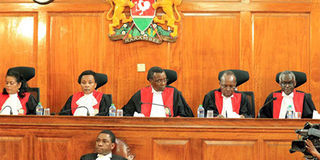The Supreme Court of Kenya will forever be known as a trailblazer

Supreme Court of Kenya judges on September 20, 2017 before delivering a detailed judgement on reasons for nullifying President Kenyatta's re-election. For such a bold decision, the court will forever be known as a trailblazer. PHOTO | JEFF ANGOTE | NATION MEDIA GROUP
What you need to know:
The determination of the case showed that the Judiciary is impartial and judges are expected to uphold the law in accordance with the constitution.
Equally, in the pages of the world’s judicial history, Kenya will forever be known as a trailblazer, joining the company of the Maldives, Austria and Ukraine.
Following the historic ruling, a total of 308 election petitions have been filed. In 2013, some 188 petitions were filed.
Kenya has been long known to have a biased Judiciary. In fact, the judicial body received less than favourable reviews, particularly during the Moi era.
The former President was believed to have over-reaching executive powers, and was known to leverage those powers to influence judges into court decisions that only favoured him and his patrons.
For opposition leaders and layman alike, neither group could find unbiased recourse to settle legal disputes.
In 1992, Kenya held its first multi-party elections. Kenneth Matiba, a presidential candidate, challenged the election of President Moi in the case of Matiba v Moi (Civil Application No NAI 241 of 1993).
ELECTION PETITION
This was the first ever election petition filed against a sitting President in Kenya. However, this case did not succeed because the then President, through his advocates, challenged the affidavit in the petition. It was stated that it was signed by his wife instead of the petitioner who was unwell.
In addition, the law then required that a petitioner serves the President or any other respondent in the case directly and this was a scary thought for many. In 1997, Mwai Kibaki filed a petition to challenge the election of President Moi and, just like the previous petition five years before, the case did not succeed on account of technicalities.
Most presidential petitions against the election of a sitting President in Kenya and in Africa favoured the incumbent.
But a tidal wave of significant changes began in 2010 with the promulgation of the new constitution. For the first time in the new democracy’s history, Kenyans felt progress and belief in a system that had longed failed them.
The historic injustices that took place in the nineties initiated the process of replacing the previous constitution with the hope of improving human rights; reducing the powers of the President; creating an independent election body; and strengthening the Judiciary among others.
JUDICIAL REFORMS
When the new constitution came into force, the first arm of government to undergo reforms was the Judiciary. A tribunal was set up to investigate the conduct of judges.
The findings saw judges on the other side of the law, accused of malpractice and gross misconduct. The tribunal found that most judges had been influenced by powerful politicians in government to make rulings in their favour.
The reforms enacted were necessary to strengthen the Judiciary and shield it from government interference.
The judicial tribunal began a series of important adjustments which, in part, led to the historic September 1, 2017, Supreme Court decision.
FIRST PETITION
In 2013, Raila Odinga disputed the election of Uhuru Kenyatta but lost the petition. This was the first petition to be filed under the 2010 constitution.
In 2017, he again disputed the re-election of Kenyatta citing irregularities in the election process. He won the petition and the Supreme Court nullified Uhuru’s re-election.
The court went further to instruct the election body to hold fresh elections in 60 days. This was a historic moment in Kenya – the first country in Africa to nullify the election of a sitting President.
It put Kenya on the map but, more so, signified a new era of the Kenyan Judiciary. The determination of the case showed that the Judiciary is impartial and judges are expected to uphold the law in accordance with the constitution.
Never before, in Kenya’s history, Africa’s history and only the fourth time in the world’s history has a Supreme Court nullified a presidential election.
INDEPENDENT
This decision has enshrined Kenya’s Supreme Court as one of the most independent, just and incorruptible courts on the continent.
Equally, in the pages of the world’s judicial history, Kenya will forever be known as a trailblazer, joining the company of the Maldives, Austria and Ukraine.
For democracy’s sake, Kenya now has a stronger and more impartial Judiciary, which is identified as a key milestone for a true democracy.
Following the historic ruling, a total of 308 election petitions have been filed. In 2013, some 188 petitions were filed.
This number has significantly increased which indicates that the Judiciary is capable of handling the cases.
IMMUNITY
The manifestation of an independent Judiciary is visible in article 159 and 160 of the Constitution.
The judges are guided by the law and the constitution as they deliver their judgments. Articles 159 and 160 further give the judges immunity while they perform their functions.
Further protections make the process of removing a judge and the Chief Justice under the new 2010 constitution arduous and lengthy.
By dint of article 168(1), a judge of a superior court may be removed from office only on the grounds of: Inability to perform the functions of office arising from mental or physical incapacity, a breach of code of conduct prescribed for judges of superior courts by an Act of Parliament, bankruptcy, incompetence or gross misconduct or misbehaviour.
Article 168 (2) stipulates that the removal of a judge may be initiated only by the Judicial Service Commission (JSC) acting on its own motion or on the petition of any person to it.
Awele and Murumba are partners at Murumba & Awele Advocates




